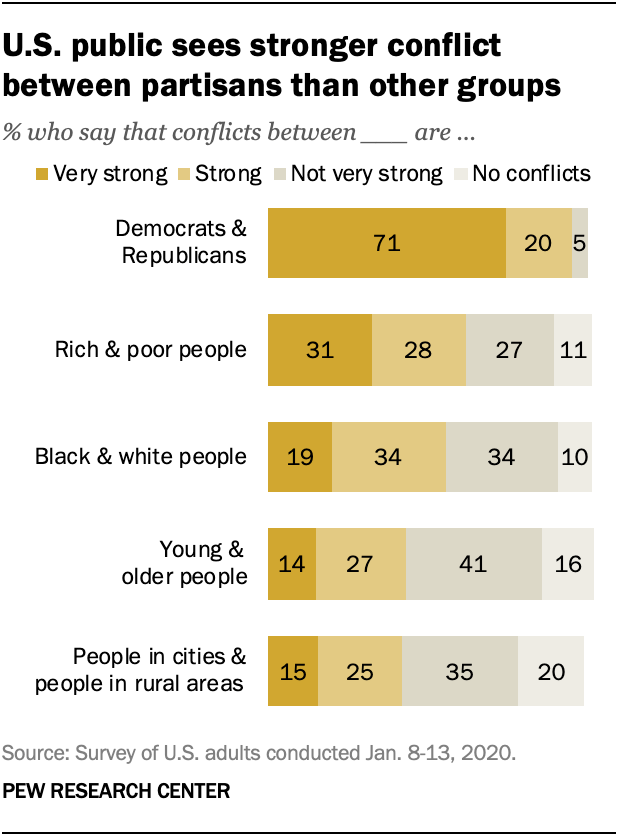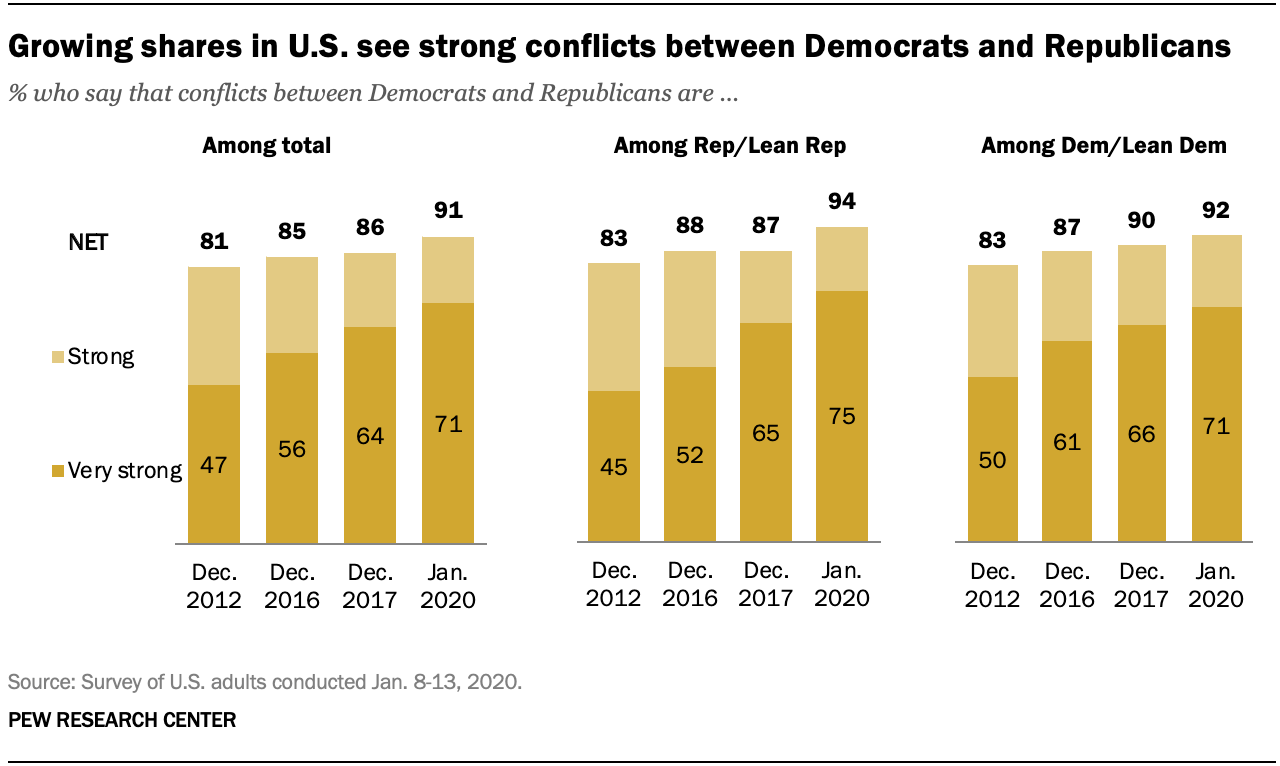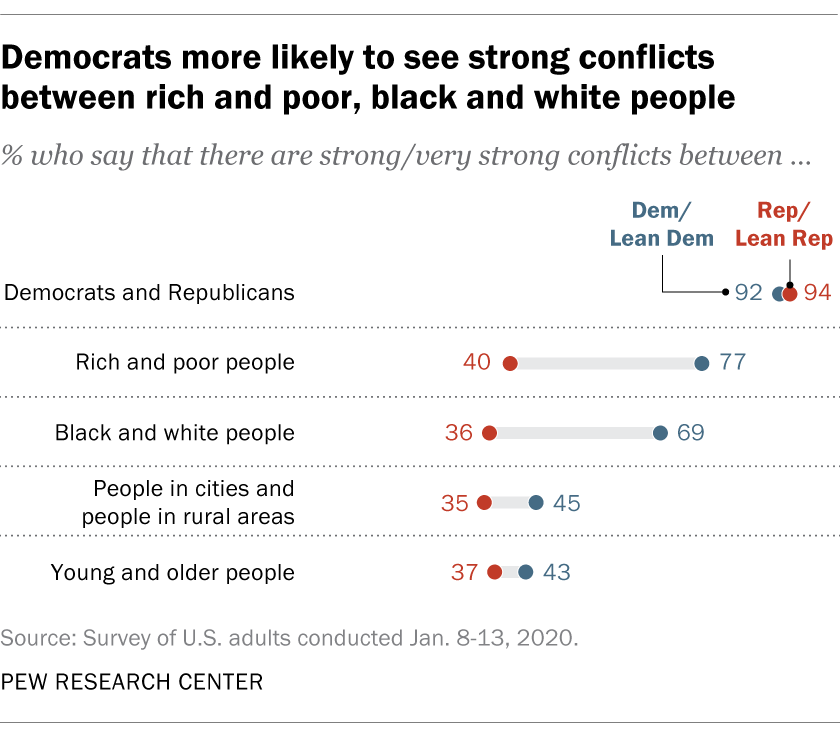
Since at least 2012, Americans have been more likely to say there are strong conflicts between Democrats and Republicans than exist between other groups in U.S. society, such as rich and poor people, young and older people, and black and white people.
But as a contentious political year unfolds, the share of adults who see strong partisan conflicts – particularly the share who perceive very strong conflicts between Democrats and Republicans – is much higher today than in 2016 or 2012, when the last two presidential elections took place.
About nine-in-ten Americans (91%) say that conflicts between the party coalitions are either strong or very strong, according to a Pew Research Center survey in January. About seven-in-ten (71%) say these conflicts are very strong.
How we did this
For this analysis on how Americans view conflicts between partisans and other groups in society, we surveyed 1,504 U.S. adults in January 2020. Everyone who took part is a member of Pew Research Center’s American Trends Panel (ATP), an online survey panel that is recruited through national, random sampling of residential addresses. This way nearly all U.S. adults have a chance of selection. The survey is weighted to be representative of the U.S. adult population by gender, race, ethnicity, partisan affiliation, education and other categories. Read more about the ATP’s methodology.
Here are the questions asked for this report, along with responses, and its methodology.
The perception of these partisan divisions far overshadows that of conflicts between other groups in American society.
A narrower majority of adults (59%) say strong or very strong conflicts exist between rich people and poor people, including 31% who say these conflicts are very strong. About half of Americans (53%) say there are strong conflicts between black and white people, although just 19% say these conflicts are very strong.

Fewer than half of Americans say there are strong or very strong conflicts between young people and older people (41%) or between people who live in cities and those in rural areas (40%).
Both Republicans and GOP-leaning independents (94%) and Democrats and Democratic leaners (92%) overwhelmingly see strong conflicts between the two parties, and seven-in-ten or more in both parties say they are very strong (75% of Republicans and 71% of Democrats). Liberal Democrats are more likely to say the conflicts are very strong than moderate and conservative Democrats (75% vs. 66%). Similarly, conservative Republicans more often say this than moderate and liberal Republicans (80% vs. 65%).
Americans are now substantially more likely to see very strong conflicts between Democrats and Republicans than they were in the past. When the Center first asked the question in December 2012, 47% of Americans characterized partisan conflicts as very strong. Four years later, in December 2016, 56% said this, and 71% see these conflicts as very strong today.
This trend is consistent with rising partisan antipathy over the last several years, including larger shares in each party associating negative traits with members of the opposing party and rating the opposing partisans negatively.

While there are only modest partisan differences in the shares saying there are strong conflicts between young and older people or between people in cities and those in rural areas, Democrats and Democratic leaners are much more likely than Republicans and Republican leaners to say there are strong or very strong conflicts between the rich and the poor (77% vs. 40%, respectively) and between white people and black people (69% vs. 36%).
By relatively wide margins, black Americans are more likely than whites to say they see strong or very strong conflicts between the two racial groups (70% vs. 47%) and between the rich and poor (74% vs. 56%). Similarly, black Americans (51%) are somewhat more likely than whites (38%) to say these conflicts exist between young and older people. These differences are much less pronounced when accounting for partisanship – for instance, 73% of black Democrats and 66% of white Democrats say there are strong or very strong conflicts between white and black people.
Adults under the age of 30 are somewhat more likely to report strong or very strong conflicts between older and younger people – 51% say this, compared with about four-in-ten of those in older age groups.
Note: Here are the questions asked for this report, along with responses, and its methodology.
